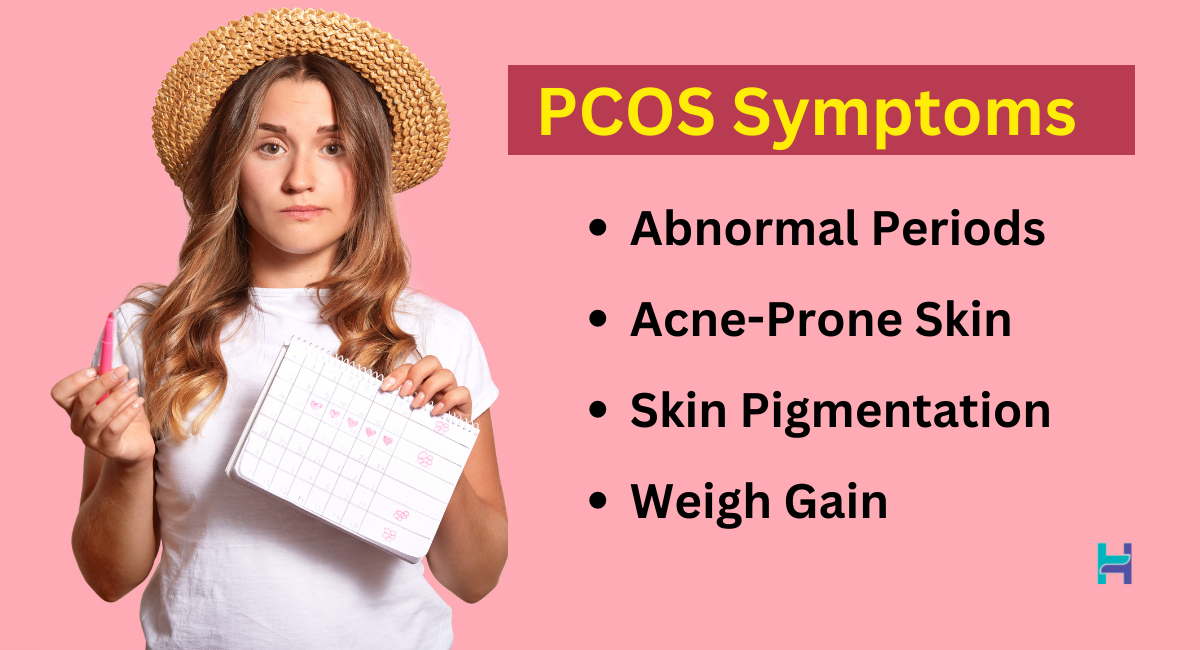Polycystic Ovary Syndrome (PCOS) is a hormonal disorder that affects women of reproductive age. It is a common condition that affects up to 10% of women worldwide. PCOS can cause a range of symptoms, including irregular menstrual cycles, weight gain, acne, and excess hair growth.
However, one of the most common and significant symptoms of PCOS is menstrual irregularity. Women with PCOS may experience infrequent or absent periods due to hormonal imbalances that affect the ovulation process. In this article, we will provide a brief overview of PCOS and its impact on menstrual cycles, as well as strategies for managing these symptoms at home.
In PCOS, the ovaries produce excessive amounts of androgens, which are male hormones that are normally present in women in smaller amounts.
This hormonal imbalance can affect the regularity of menstrual cycles, causing them to become irregular, infrequent, or absent.
In some cases, women with PCOS may experience heavy bleeding during their periods. Most people get confused with PCOS & PCOD. Here is a detailed discussion about PCOD vs. PCOS which you should considering reading.

How to get periods naturally in PCOS
There are various ways to treat PCOS symptoms at home, and making lifestyle changes is one of the most effective approaches. Eating a healthy, balanced diet and exercising regularly can help manage symptoms such as weight gain, irregular periods, and insulin resistance.
Here are seven ways to manage PCOS symptoms at home.
1. Maintain a healthy diet
Maintaining a healthy diet is an essential way to manage PCOS symptoms. Eating a balanced diet that is low in carbohydrates and sugars can help regulate insulin levels, which is often disrupted in PCOS.
Eating foods that are rich in fiber and healthy fats can also help reduce inflammation and improve overall health. It is also important to avoid processed and refined foods as much as possible, as these can contribute to weight gain and hormonal imbalances.
2. Exercise regularly
Regular exercise can help manage PCOS symptoms by reducing insulin resistance and improving metabolic function. Aim to get at least 30 minutes of moderate exercise daily, such as brisk walking, jogging, or cycling.
Strength training exercises can also be helpful in building lean muscle mass, which can help manage weight and improve overall health.
3. Get enough sleep
Getting enough sleep is important for managing PCOS symptoms. Lack of sleep can cause hormonal imbalances, insulin resistance, and increased stress levels. Aim to get at least 7-8 hours of sleep each night, and establish a regular sleep routine that includes winding down before bed and avoiding electronic devices.
4. Manage stress levels
Stress can exacerbate PCOS symptoms by causing hormonal imbalances and increasing inflammation. Managing stress levels through relaxation techniques such as yoga, meditation, or deep breathing can be helpful in reducing symptoms. It is also important to prioritize self-care and engage in activities that bring joy and reduce stress levels.
5. Use natural remedies
Using natural remedies such as herbal supplements and essential oils may also be helpful in managing PCOS symptoms. Certain herbs such as cinnamon and fenugreek may help regulate insulin levels, while essential oils such as lavender and peppermint may help reduce stress and improve mood.
6. Keep track of your menstrual cycle
Keeping track of your menstrual cycle can help you identify any irregularities and manage PCOS symptoms. Use a calendar or menstrual tracking app to keep track of your periods, and note any changes or irregularities. This can help you identify potential hormonal imbalances or other issues that may need medical attention.
7. Maintain a healthy weight
Maintaining a healthy weight is crucial for managing PCOS symptoms, as excess weight can worsen insulin resistance and hormonal imbalances. Eating a healthy diet and exercising regularly can help manage weight, but it is also important to seek medical attention if weight management is an ongoing issue. A healthcare provider may recommend medical interventions such as medication or surgery to manage weight and improve overall health.

Managing PCOS for Long-Term Health
PCOS can be a challenging condition to manage, but there are ways to take care of yourself and stay healthy in the long run. You should consult with your gynocologist and have regular check-ups to make sure you're doing everything you can to manage PCOS.
Your gynocologist will help you managing the symptoms. They can also help you come up with a plan to stay healthy and avoid complications.
There are also things you can do at home to manage PCOS, like we have mentioned above. If you are interested in knowing how Ashokarishta helps relieve PCOS symptoms, then head over to our blog about PCOS and Ashokarishta.
FAQs on Managing PCOS Symptoms
Q: How long can PCOS delay your period?
A: PCOS can delay your period for several weeks or even months. The length of delay varies from person to person.
Q: How long is a PCOS period cycle?
A: Women with PCOS may have irregular periods, which means the length of their menstrual cycle can vary from month to month. Some may have very long cycles, while others may have very short or no cycles at all.
Q: Can PCOS go away naturally?
A: While there is no cure for PCOS, it is possible for some women to manage the symptoms effectively and even have their periods return to a regular cycle without medical intervention.
Q: Is PCOD and PCOS same?
A: PCOD (Polycystic Ovary Disease) and PCOS (Polycystic Ovary Syndrome) are often used interchangeably but they are not exactly the same. PCOD refers to the presence of multiple cysts on the ovaries while PCOS is a hormonal disorder that can cause cysts and other symptoms.
Q: Which fruit is good for PCOD?
A: Fruits that are rich in antioxidants and fiber such as pomegranate, papayas, apples, and pears are considered good for PCOD.
Q: Can stress cause polycystic ovaries?
A: While stress is not a direct cause of PCOS, it can contribute to hormonal imbalances, which can worsen the symptoms of PCOS.
Q: Can people with PCOS eat pomegranate?
A: Yes, pomegranate is a good fruit for people with PCOS because it is rich in antioxidants and can help reduce inflammation in the body.
Q: Does papaya help in PCOS?
A: Papaya is a good source of fiber and antioxidants, making it a healthy fruit for people with PCOS. However, it is not a cure for PCOS and should be consumed as part of a balanced diet. Read our blog on eating papaya during periods.
On a Final note
You can take to manage the symptoms and promote overall health. Maintaining a healthy diet, exercising regularly, getting enough sleep, managing stress levels, using natural remedies, keeping track of your menstrual cycle, and maintaining a healthy weight are all important strategies for managing PCOS at home.
It's also important to seek support from your OBGYN or gynecologist, to develop a personalized treatment plan and manage PCOS in the long term. By taking these steps and staying proactive about your health, you can improve your quality of life and manage the symptoms of PCOS.
We would love to know how are you managing things at your end. Do comment below and let us know.



